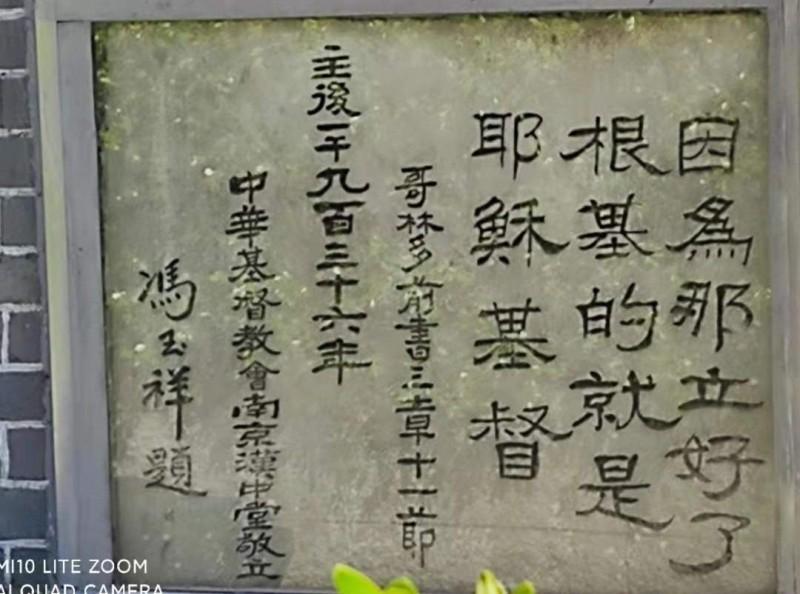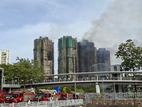In mid-March, I had the opportunity of a church tour in Nanjing, the once-old capital of six dynasties. I passed through the bustling Xinjiekou, where among the ancient buildings I came to Mochou Lu Church, the earliest Christian church built in Nanjing.
You can read its history which was put up outside the church. In 1873, Albert Whiting and Charles Leaman from the American Presbyterian Church came to Nanjing to preach the gospel. They built a four-pole chapel outside the Hanxi Gate on Four-pole Road. In 1884, they built Mingde Girls' Middle School (now Nanjing Normal College of Pre-school Education). In 1888, Charles Leaman built "Jesus Hall" on the east side of Mingde Girls' Middle School, which accommodated 400 people. Sun Xisheng of Shandong Province was hired as the first Chinese pastor ever for 17 years. In 1927, it was renamed as Nanjing Hanzhong Road Church of Chinese Christian Church. It was the Nanjing parish church of the Jiang'an Council. In 1934, Four-pole Road was renamed as Mochou (No-worries; translator’s note) Road and the old church was demolished. Pastor Bao Zhong raised 1100 taels of gold for its reconstruction. It was officially opened on October 16, 1936.
On the stone stele outside the church, you can read the carved words which were handwritten by General Feng Yuxiang in Chinese in 1936. The General quoted from 1 Corinthians 3:11, "For no one can lay any foundation other than the one already laid, which is Jesus Christ." General Feng was known as the "Christian General". I have referred to some materials to share with you the anecdotes of his belief experience.
Feng Yuxiang (1882-1948), a native of Chao County, Anhui Province, was a military strategist in modern China. He served as the brigade commander of the 36th Huncheng Brigade of Beiyang Army, the commander of the 11th Division, Shaanxi, Henan and the Army Review Ambassador. In 1924, he launched a coup in Beijing during the second Zhifeng War and changed his headquarters into the National Army in which he served as commander-in-chief and commander of the First Army. In September 1926, when the National Revolutionary Army attacked Wuhan, he made an oath in Wuyuan (now Inner Mongolia Autonomous Region) announcing that his army had joined the Chinese Nationalist Party. In 1927, he took up the post of Commander-in-Chief of the Second Kuomintang Army in Xi'an, and participated in the anti-communist activities launched by Chiang Kai-shek and Wang Jingwei. Since 1928, due to the General’s conflict of interests with Chiang Kai-shek, he led his troops to oppose Chiang Kai-shek. So, successively the Feng-Chiang War and the Central Plains War broke out. In 1931, the Mukden Incident broke out, the General advocated resisting Japan and opposed Chiang Kai-shek's non-resistance policy and fascist dictatorship. In 1935, he cooperated with the Communist Party of China and organized the people's anti-Japanese alliance in Zhangjiakou as commander-in-chief, but failed under the joint attack of Chiang Kai-shek and the Japanese army. In 1936, he was the vice-chairman of the Military Commission of Nanjing National Government. After the outbreak of the Anti-Japanese War, he was appointed commander of the Sixth Theater and was dismissed by Chiang. After the victory of the Anti-Japanese War, he continued to take the position of cooperation with the Communist Party of China, opposed Chiang Kai-shek's civil war, dictatorship and traitorous policies. He initiated the organization of the Chinese Kuomintang Committee in Li Jishen. In 1946, he went abroad to inspect water conservancy. In September 1948, in response to the call of the Communist Party of China, he returned to China to participate in the preparatory work for the Political Consultative Conference and was killed in a ship fire in the Black Sea.
In 1913, when Feng Yuxiang was stationed in Beijing, he suffered from back sores. A friend named Liu Kuan (Beijing native, Christian) introduced him to an American church hospital. He saw that the American doctors who treated him always prayed and said "Amen, Amen" before and after the procedures, and he soon recovered from his illness. He was grateful to the doctor and Liu Kuan and they took the opportunity to preach the gospel to him. Feng Yuxiang had a good impression about Christianity, and he also thought that God's grace was the reason why he quickly got better. He was baptized into Christ and joined the Methodist church. Later, people called him the "Christian General" and that was how the name came to be.
In 1913, when the 16th Huncheng Brigade was stationed in Changde, Hunan Province, Liu, the nephew of Feng Yuxiang's boss Lu Jianzhang, visited them. Liu suffered from mental illness, so Feng Yuxiang asked O T Logqm, an American doctor in Guangde Hospital to give him treatment. The hospital was a local church hospital. When Liu saw a blonde foreigner, he thought he saw a ghost, he would hide away to avoid seeing the doctor. When Logqm treated him for the second time, Liu was playing with a Browning pistol. When he saw Doctor Logqm, he suddenly raised his gun and shot him in the chest. At that time, Feng Yuxiang was also inside the clinic. When he heard the gunshot, he quickly went up to hold Liu's waist. Liu shot Feng Yuxiang too. Feng's hands and shoulders were slightly injured, but unfortunately Logqm died because of his serious injuries. Feng Yuxiang held a funeral for Dr. O T Logqm with great pain and gave Mrs. Logqm a pension of 3,000 yuan in silver. However, Mrs Logqm refused to accept it. General Feng remitted the money to the couple’s son in the United States, who said he wanted nothing and returned the money back to General Feng. In desperation, Feng Yuxiang built a house made of wrought iron with the money and named it Logqm Memorial Church. It commemorates Dr. O T Logqm and served as a place of worship. As it was a house that can be disassembled and folded, it could be taken away with the army when the troops moved the defense. From 1922 to 1925, when Feng’s Army was stationed in Nanyuan, this memorial church was located in the square outside the inspection office of the Army. However, the memorial church was renamed the YMCA. It was in the form of an auditorium, which can accommodate five or six hundred people.
Ever since the American church doctors cured sores and Dr. O T Logqm saved lives and sacrificed himself with his family members refusing the pension, General Feng Yuxiang thought that the Christian spirit could influence and educate people. Besides his belief in Christ Jesus, he also advocated that all officers and men of his army should join Christianity. In the Northwest Army to which he belonged, the most faithful believer in Jesus Christ was his general, Zhang Zhijiang, who believed that Christ was very pious. He not only prayed after getting up and before going to bed but also prayed before meals every day. Often, when the food got cold, he was still praying. Sometimes he might suddenly kneel on the ground and pray while he was working. He liked to quote the Bible in his speech and people gave him the nickname "Zhang Bible".
When Feng Yuxiang came back from the Soviet Union in 1926, he came into contact with Marxism-Leninism and realized that Christianity in China was a means of imperialism as a cultural invasion. Therefore, when he was in Wuyuan to make an oath as commander-in-chief of the Kuomintang Coalition forces, he sent a message to himself and all his officers and men to quit Christianity. However, Zhang Zhijiang strongly opposed it and did not quit. He had been a faithful Christian all his life.
The religious activities of the Northwest Army usually took the battalion as a unit, and the prayer was led by the duty officer before meals every day. The officers and men of the whole battalion bowed their heads and kept silent until the duty officer said "Amen" after praying, and everyone uttered "Amen". Every Sunday, the battalion commander or the company commander on duty would guide the reading of a chapter of the Bible from the New Testament. A pastor would explain it and then sang one or two hymns to the Lord. The service time was about one to two hours. Each battalion organized a choir of about 20 members comprised of well-educated soldiers. The choirs were led by a platoon leader or squad leader who was good at music, singing, and trained by a pastor. Each regiment also had a full-time chaplain in plain clothes. In case of a big ceremony, before Feng Yuxiang assembled his troops to make a speech, he had to make a prayer first and the prayer words were read by the General officer on duty for that day.
While training in Nanyuan, Feng Yuxiang would go to each brigade to allocate salaries to soldiers by name once a month. On Sundays, battalion commanders of various brigades and regiments took turns to deliver speeches to units so that officers and men could know each other well. As such, they could better coordinate with each other in wartime. Before speeches, weapons, internal affairs and hygiene were to be checked. Then the team would gather for Bible study and read out the New Testament, and then leaders would speak. The title of the speech would be determined by the speaker himself and some of them would print out lecture notes.
In 1923, Feng Yuxiang's first wife, Liu Dezhen, died, leaving behind two sons and three daughters, all of whom were in their infancy and needed care. General Zhang Zhijiang and other officers repeatedly urged him to get married again. He gradually had a second wife. While he was training in Beijing, he went to the YMCA of Beijing to worship every day and met Ms Li Dequan, who was then director general of the YMCA of Beijing. Li was a celibate at that time. Because they could meet frequently and got familiar with each other, they had profound talks about each other many times, and finally ended up in marriage at 42 years old and 28 years old. Later, Mrs Feng gave birth to a boy and three girls.
In modern history, ordaining pastors in the army was the only practice in Feng’s Army apart from the Taiping Heavenly Kingdom. Before 1912, he only personally believed in Christ and had not promoted it to the army. He once gave the following testimony. Before he believed in Christ, he had a brother who was a sinner. Feng Yuxiang hated him to death and was determined to kill him. Before leaving for his brother's residence, he passed by a church and suddenly heard part of a sermon about the truth that Christians should love their enemies. Upon hearing that, Feng entered the church.
After being stationed in Changde in 1918, Christianity began to be promoted in the army. At first, some pastors were hired to preach to the whole army. Pastors were from Changde which was nearby and Hankou which was very far away. They were from both China and abroad. Later, chaplains were appointed. With the expansion of the team, roughly each brigade was assigned a pastor. The maximum was up to seven or eight pastors per brigade. The permanent pastors were all Chinese, most of them were introduced by Dr. Liu Tingfang from the Methodist church. Feng was baptized by him and they had a good relationship.
The army had a set of religious propagating ceremonies. All officers and men read the scriptures, prayed and sang poems in the first week, which was presided over by pastors who would talk about the ascension of souls to heaven. Every religious officer in the army would be given a Bible to read for an hour. Before eating and sleeping, they sang hymns and prayed. Every Sunday, religious officers and soldiers gathered in the training ground (or brigade headquarters) to worship at the pastor's residence. Sometimes General Feng also hosted prayer meetings and gave sermons. His sermon focused on "spiritualism", that was combining Christian doctrine with Chinese sages and many feudal moral concepts, with the latter as the main focus. He presided over the compilation of three spiritual books: Patriotism, Military Discipline, and Moral Spirit. The books are divided into lists of proverbs. It was stipulated that every officer must recite them.
Because the army carried out Christianity, military life had a special feature, and Feng Yuxiang compiled a lot of military songs (he paid special attention to military songs as publicity, which other warlords did not have). Almost all military songs adopted the tune of hymns. Every time they were sung, they were played by military bands. Therefore, singing military songs in the tone of hymns was a rare wonder of the Chinese army.
Appointing chaplains was practiced until 1926 when coming back from the Soviet Union; he abolished the military chaplain system and sent them back to churches.
(This article refers to "Ci Hai" and "The Feng Yuxiang I Know", Chinese Literature and History Publishing House, "Compilation of Literature and History and Learning Committee of the National Committee of the Chinese People's Political Consultative Conference".)
- Translated by Charlie Li












